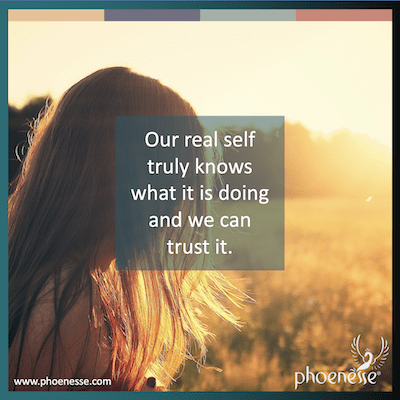
Our real self truly knows what it is doing and we can trust it.
Elusive as a full moon on a dark and cloudy night, self-confidence can be hard to pin down. Truth is, we know it when we feel it. And we’ve all felt it, at least a time or two. It’s that moment when we’re solid and we know what needs to happen. We align with our truest nature and live from our real self.
So what exactly is this real self?
Our real self is the most alive part of us that expresses itself freely when liberated from the layers of doubt that so often gunk up the works. If we’re a healthy and mature person, we’re nearly always reacting from this place. Our intuition is guiding us and we can totally trust ourselves.
Too often, though, that’s not where we’re coming from. We’re up to our ears with fears that drive distracting compulsions. And all our layers of error and illusion only pull us further into error and illusion, robbing us of peace. The whole point, then, of all this self-searching work is to free ourselves from those obstructing layers so our real self can get into the driver’s seat.
Our real self is right there under our noses, but for the most part, we’ve lost sight of it. Since we’re not in touch with it much of the time, we prefer to go on expressing another version of ourselves—the part that lives on compulsive drives and impulses. Thing is, that part is not who we really and truly are, and it blocks our intuition. Here’s the kicker: whatever comes from this other level is not expressing our real feelings, for those can only come from our real self.
The misguided belief that blocks the Real Self
Once we start doing our work, we’ll become aware of just how prevalent all our compulsive currents are. We will begin to feel these forcing currents distinctly, almost like some kind of foreign body that’s taken over. And wherever such a forcing current exists, it belies some basic misunderstanding about life.
It all stems from our fundamental desires to be happy and to be loved, as being happy and being loved are always linked. The problem is, the child in us believes that we can only be happy if we get our way. So sometimes we simply desire to be approved of or admired, which are variations of being loved. Fair enough. Things start to go wonky, though, when we start believing that this can’t happen if our dear ones have shortcomings we don’t like or opinions we don’t share. Then, we think—in this split-off young part of ourselves—our happiness is doomed.
As long as we cling to this notion that “in order to be happy, my will must be done,” we are doomed.
In truth, as long as we cling to this notion that “in order to be happy, my will must be done,” we are doomed. This hidden conviction is what blocks our freedom. It creates struggle and unending anxiety, and the less aware of this we are, the more potent it becomes. For unconsciously, we become locked into believing that getting our way is akin to life and death. If our will is not done, that spells annihilation. Exclamation point! The fear this creates is so powerful, we often can’t admit it when we haven’t gotten our way, and instead we pretend that we no longer desire whatever it is we really want.
Sure, there’s pride here, but there’s also more than that. There’s a deep-seated conviction that not getting what we want equates to interminable unhappiness. At the same time, a more grown-up part of us realizes that, no, we can’t always have what we want. But unfortunately such thinking doesn’t really help—it just adds to the conflict. As long as we secretly believe that having our way and being happy are one and the same thing, we’re stuck in the ditch. More and more conflict is sure to come about.
So while we’re ardently striving to find inner fulfillment, we are simultaneously living in fear that we won’t succeed. Unconsciously, we attempt to hide such a “failure” from ourselves, and this sets currents flowing in two opposite directions. One current calls for us to push, push, push, trying to force people and life circumstances to do our will; our goal is to conquer reality and make everything go our way. The other current going in the other direction comes from our fear that we’ll never get what we want. This causes us to act in such defeatist ways that we sabotage the possibility of receiving what we ordinarily could have had.
Neither of these beliefs—either that we must always get what we want, or that we can never get what we want—is real. This means that all our forcing and defending against these wrong conclusions is equally unreal. Every drive and impulse we put into the service of these imaginary notions will therefore be ineffective and cause further damage. This is what’s covering up our real self and keeping us from walking with self-confidence in the world.
So what’s the truth of the matter?
In reality, it does not make us unhappy to not always get our way. And it does not make us unhappy if everyone doesn’t love and admire us all the time. Further, it doesn’t make us unhappy when others don’t agree with us or have faults we don’t like. Beyond this, it’s not reality that we can never get what we wish. And it’s not true that we can never be loved and respected. Our real self knows all of this.
When we’re in the flow of our real self, we are smoothly carried forward and not caught in a duality of two equally wrong ideas. Trapped by such an illusion, we often feel there’s nothing secure to grab onto. We would be right. For we can’t hold onto reality—which is the only thing that’s secure—as long as we cling to illusion. Indeed, safety can only be found in the flexible, ever-changing life stream that is not connected to whether or not we got our wish. The way out then—the way to find safety—is by finding our own personal form of hanging on.
We must look for the tense nucleus inside of us that loudly claims, “I want!” It is harsh and rigid, and at the same time wobbly as a Weeble. Once we discover it, we must also find the means we resort to, either to get our way or to keep ourselves from the horrors of not getting our way.
The three ways we hang on
Submission
There are basically three problematic attitudes that arise from our forcing current. One of them is submissiveness. When we submit, we cling, hoping against hope that we’ll receive the love we want. To get love, we’ll sell our own soul, forsaking our own opinions and not standing up for ourselves. We’ll put ourselves at a disadvantage, costing us our dignity and our self-respect.
All this we cover over with our rationalizations of how selfless we are, always sacrificing and being so doggone loving. In truth, we’re just using a forcing current in a very blatant and self-centered way. We’re bargaining, essentially saying, “If I submit to you, you have to give me my way and love me and make me happy.”
Outwardly, we may seem meek and oh-so-flexible, but inwardly we’re hard as a rock. We have to find this hidden nucleus, no matter how cleverly it’s hidden. What’s more, we have to understand it. Make no mistake, this isn’t love, so don’t be fooled. It might look like love on the surface, but it’s made up of something very different. For whenever we act to appease another person, there’s something we want. We’re only giving to get, and we’re willing to grab for it; we’re not willing to wait for it to be freely given.
Aggression
There’s another attitude we choose, especially when we feel hopeless about getting love and being happy. In this case, we think our only hope is to use all of our power—all of our ruthlessness—to defeat the enemy who is always standing in our way. We become hostile, believing the whole world is stacked against us, meaning aggression is the only means for grabbing the happiness we so desperately desire.
Needless to say, this doesn’t work worth a damn. In fact, the opposite is generally what happens as people feel antagonized by us and become hostile towards us. And doesn’t that seem to prove our point? What we’re missing is that we are the ones who created this turmoil and are constantly stirring the pot. Tracing how all this ties together can be tricky.
While it’s fairly easy to see how the submissive person makes themselves dependent, the hostile one may deceive themselves into thinking they’re being independent, taking on the world by themselves and not bending to the will of others. What they don’t realize is that they’re just as lost and therefore just as dependent, simply choosing a different strategy for getting their way and thereby landing happiness.
The aggressive person rejects “touchy-feely” emotions, thinking that those make a person soft. To them, softness is dangerous territory. So instead of having real feelings, they fabricate a kind of inner hardness that’s not any closer to love than the suck-up affection of a submissive person.
Withdrawal
The third way of coping is to withdraw. Here, we convince ourselves that it just ain’t never gonna happen, and this seems such a tragedy, we fall on our sword and pretend we don’t even want it. Isolation becomes our only friend so we can avoid the dreaded feeling of defeat. Worst part is, we don’t even realize what a lousy bargain we made.
Yeah, we’ve kept ourselves safe from disappointment and failure. But in reality, those things wouldn’t hurt half as much as we imagine. Meanwhile happiness—which we miss out on while we vegetate and avoid—could well have been ours. It’s true, when we take this tack, we may seem more cheerful and well-adjusted than those who follow the first two tracks. But deep down, we’re wallowing in even greater hopelessness. If that weren’t the case, we wouldn’t have resorted to such drastic measures.
How manipulating feelings hampers the Real Self
All three of these pseudo-solutions have the effect of keeping us from our real feelings. Often, we go one more and cripple our feelings even further. We either whip them into a frenzy, exaggerating them so as to obligate someone to love and obey us. Or, in fear of defeat, we’ll squash our intuition like a bug, and prevent our real feelings from guiding us along the river of life.
Truth be told, our real self has real wisdom and it may at times guide our real feelings into subsiding in a particular situation. But that’s not at all the same as what we do through our artificial manipulation, even if the goal seems the same. Bottom line, our real self truly knows what it is doing and we can trust it. Our compulsive behaviors, by contrast, are utterly blind.
When we bump haphazardly through life, we might be right or we might be wrong. Imagine how insecure that makes us feel. It’s a forced and unnatural way to walk in the world. Our real self, on the other hand, acts in harmony with life. So then whatever happens feels organic and right. We can have confidence in our choices.
Our compulsive behaviors, by contrast, are utterly blind.
When we make our feelings bigger or smaller than they really are, we live in unreality. And make no mistake, such manipulation of our feelings is not a zero-sum game. It leaves a mark. For feelings are a living organism, and like anything alive, if left all alone or constantly thwarted, they will suffer. This is true whether we’re stilting unpleasant feelings or over-dramatizing positive ones. It happens when we convince ourselves to feel resentment or contempt for someone, thinking this protects us against the tragedy of feeling rejected.
It’s no surprise then that we end up with no idea of what we really feel or really want, much less who we really are. Our feelings are the expression of our being—of our real self—and if we constantly tie them in knots or swap them out for false but better-looking versions, we can’t get to know them. And in the end, we will feel we don’t know our true selves.
The way out: Facing our forcing current
When we find ourselves feeling obstinate and we realize that we are being unreasonable, even if we can’t yet change it, then we must see that somehow we believe our old ways are protecting us. We’re still buying the story that armor is necessary and “winning” is possible.
Truth is, we don’t have to fight, nor must we retreat to avoid the dangers of life. We don’t have to beg or cry, submit or sell our souls to have what our hearts desire. And we don’t need to constantly defend ourselves against being defeated. Our work is to find out in what specific way we feel threatened—what’s the danger?—and then let go of the stubborn “I want” current we mistakenly believe will save us.
We also need to look at our resentments, disregarding quick-and-easy excuses about how it’s because of someone else’s faults. That’s not the reason for our resentments. What we’re hoping for is an imagined advantage that comes from adopting a hostile or aggressive stance.
But resenting someone else is not an avenue that leads us to self-confidence. When we resent, we are helplessly caught in the current of resentment, unable to control our emotions anymore. If we attack the other, it is often because we want to go on hiding the same thing in ourselves.
The stronger our dislike for something in ourselves, the more we project our dislike onto others. The more hidden it is in us, the more we’ll go on the attack. We get sucked into this whirlpool and lose our ability to govern ourselves. When bound up in such a drama, is it any wonder we lack self-confidence?
There’s only one way through this mess. We’ve got to see where and how we force, jamming through a current of “I want” on the one hand, while fearing “I won’t get what I want” on the other. Banished real feelings will then slowly rise to the surface, which we couldn’t allow when we couldn’t trust ourselves.
The stronger our dislike for something in ourselves, the more we project our dislike onto others.
We will recognize our real feelings by their calmness. There’ll be no need for urgency, as real feelings don’t mind waiting. They’re firmly rooted and when they express themselves, we’re not in doubt. Best of all, they’re in sync with the universe, so they roll us in the right direction, if we’re willing to trust them.
To be clear, there will be a frenzy inside each and every one of us until we find and dissolve our hidden wrong beliefs. Then and only then can we give all this up, discovering that what arises along with real feelings is real self-confidence.
Our intuition will become a constant companion, giving us the deep inner knowing—not from our brain but from deep down in our gut—that we’re making the right decisions. We’ll spontaneously say the right things at the right time, and we’ll also know when to hold our tongue. We will do what’s needed and cut out what’s not, acting without fear. We’ll feel relaxed and yet able to concentrate at the same time. We’ll know that whatever is to come to us, will come. It can’t not. No need for worry.
Maybe it sounds impossible that we can experience serenity like this while here on Earth. Of course, we won’t get there overnight, but eventually we will arrive, often by taking two steps forward and one step back. Before long, this way of being in the flow will become our first nature. We’ll float through life, shedding our struggles like a dirty old shoe. Our potential will become our reality and we will walk with self-confidence. This can be our path. Let’s go this way.
—The Guide’s wisdom in Jill Loree’s words

Next Chapter • Return to Contents
Read more in Bones: A Building-Block Collection of 19 Fundamental Spiritual Teachings:
Two: The Importance of Feeling All Our Feelings, Including Fear | Listen to podcast
Four: Three Basic Personality Types: Reason, Will and Emotion | Listen to podcast
Seven: Love, Power and Serenity in Divinity or in Distortion | Listen to podcast
Read Original Pathwork® Lecture: #77 Self-Confidence: Its True Origin and What Prohibits It
We Can Heal | After the Ego • Blinded by Fear
Real. Clear. series | Holy Moly • Finding Gold • Bible Me This • The Pull • Pearls • Gems • Bones • Nutshells
All essays | Get a Better Boat • Living Light • Latest essays
Self. Care. series | Spilling the Script • Healing the Hurt • Doing the Work
More books | Walker • Word for Word • Spiritual Laws • Keywords



